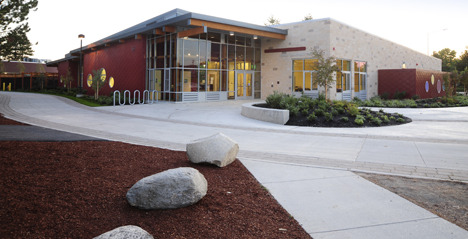Since opening its classroom doors 45 years ago, Tacoma Community College (TCC) has been a much-needed fact of the South Sound’s educational scene, most people would argue. In recent years, as classroom sizes swelled at four-year universities, community colleges such as TCC have been an important resource for people looking for a post-high-school education.
Unfortunately for TCC’s students, faculty members and administrators, the campus’s physical environment has remained mostly unchanged over those four decades. It’s a fact that hasn’t been lost on Tacoma City Councilmember Lauren Walker. “In the early-1990s, I used to go on the TCC campus to give presentations,” she recalled Tuesday during a meeting of city council’s community and economic development committee. “To be honest, I would go there and think, ‘This place needs to be updated.'”
After four decades, that could happen.
During Tuesday’s meeting, TCC President Pamela Transue and Michael McGavock, a principal at McGranahan Architects, provided an update of the campus’s facilities master plan. It is a document that was created in 2005 and underwent updates in 2007 and 2009. The master plan identifies several goals for campus improvements: create a learning environment that simulates real-world settings and brings together disparate programs and disciplines; provide for asynchronous learning outside the classroom; consolidate student services into a “one stop” center; foster availability of faculty to students; create a campus that is highly visible, attractive and engaging; provide professional development resources; develop physical campus infrastructure for current needs and future growth; and create master planning zones that support academic/program groupings and interrelationships among similar programs.
“We wanted to get rid of all of the flat roofs, which had been a nightmare for many reasons and to go with sloping and sheltering roofs with visible and inviting entrances and create a welcoming and attractive perimeter for the college,” explained Transue. “We wanted to make our students central, to keep their convenience in mind and develop smart classrooms and good use of instructional technology.”
Moreover, the master plan is a document that — funding permitted — would direct a number of campus facility improvements between 2013 and 2017. Some of the improvements include construction of a learning commons and classroom building for business, humanities, and social sciences; and renovation of the visual and performing arts building and the student services center.
Transue agreed with Councilmember Walker that facilities improvements are overdue.
“When TCC opened in 1965, it was built with less money than was intended because the bond issue at the time kept getting smaller and smaller,” said Transue. “I’ve been told that the construction cost for the campus was 10 dollars per square foot. For the next 35 years of so, there was only one small building added to the campus. Maintenance was minimal just because there wasn’t money to be able to do it. When I arrived in 1997, it was clear that the campus was in deplorable condition.”
Still, a recent visit to the campus reveals some changes. The $18.5 million Science and Engineering Building that opened in September 2007; and the $6.6 million Early Learning Center that opened in October 2009. How many of master plan projects will be completed?
That depends on funding.
Transue explained tuition goes toward the costs of operating the college. Facilities improvements are funded through the state, federal grants, and community fund-raising efforts. For state funding, projects are submitted by community and technical colleges statewide and listed by order of priority. “It’s a very complex and time-consuming process,” she said. “You can imagine what that process is like. The list is huge. That’s why just getting in the pipeline is important.” One project, a new health career center, is already in design. Transue is hopeful state funding will come through and contractors can break ground next year.
Councilmember Walkup praised the work that has already been done. “I’ve been on the campus in the last couple months to give presentations and it’s just day and night compared to the 1990s. I love seeing the master plan here.”








